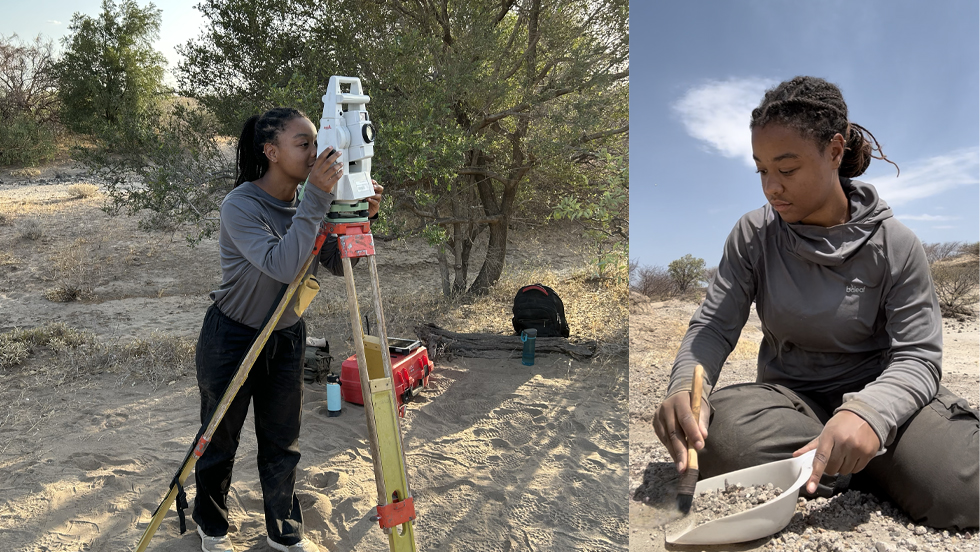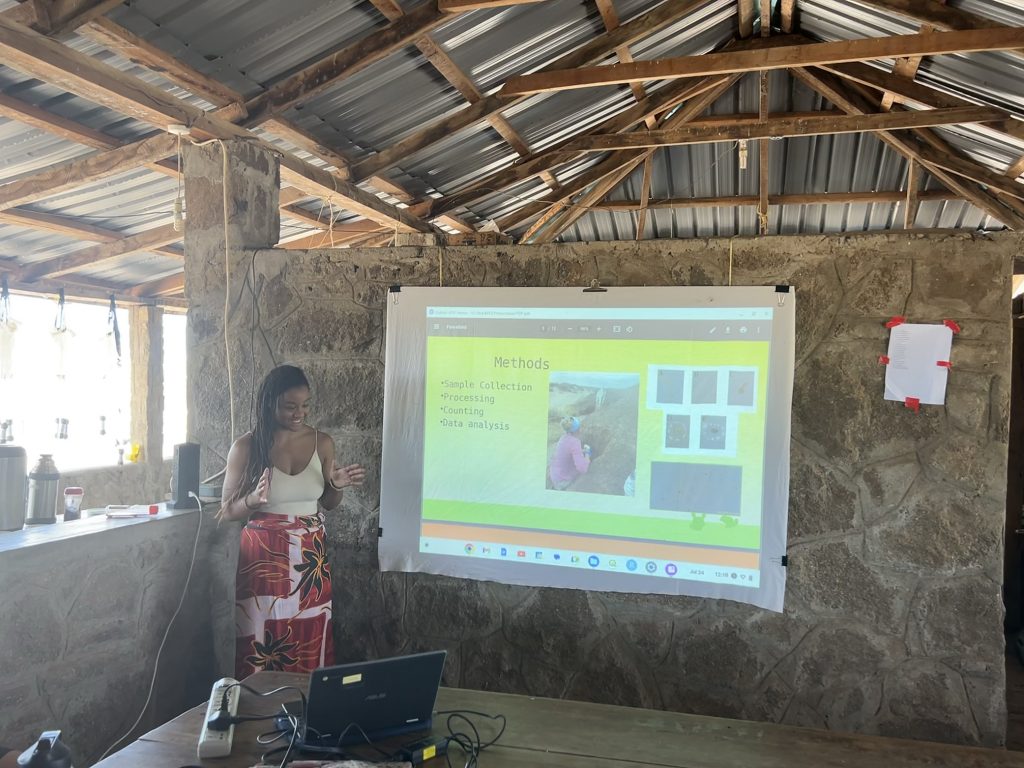
Senior Honors College student MacKenzie Pina joined a prestigious dig at Sibiloi National Park in Kenya over the summer. Her experience there is an example of Adelphi's emphasis on undergraduate research. "I could not have been better introduced to fieldwork if I had asked," she said.
MacKenzie Pina, co-captain of Adelphi’s swim team, had just returned from this year’s winter training in Puerto Rico when she received the news: She would be going to Kenya over the summer to conduct anthropological research in Sibiloi National Park, a UNESCO World Heritage Site.
She’d been accepted into the premier Koobi Fora Field School (KFFS) fellowship program, offered by George Washington University and the National Museums of Kenya.
Now back from the six-week program and starting her senior year, the Honors College student and anthropology major said the experience was “everything and more” than she expected, connecting her with students from the United States, Ethiopia, Kenya, Tanzania and South Africa, and helping her build on the extensive research she has done alongside faculty in Adelphi’s labs.
“I could not have been better introduced to fieldwork if I had asked,” she said. “I met so many amazing people and learned so much and, beyond that, I felt so supported and am now connected to an amazing network.”
“An Incredible Educational Experience”
Running this summer from June 16 to July 30, the annual KFFS program provides students with hands-on training in paleoanthropology in an area rich in Pliocene, Pleistocene and Holocene sedimentary deposits. The region has produced a treasure trove of archaeological materials as well as human and hominin—or, ancestors of modern humans—specimens.
Students develop their own projects in the program, collecting samples in the field, analyzing them and presenting their findings in the fall.

Pina presented the findings of her summer research to the other fellowship students at the Koobi Fora Field School.
“All KFFS projects are connected to studying the environment that the hominins evolved in,” Pina said. “It was actually a record year for the number of hominin remains that were found during a season. We were very lucky.”
Pina’s project tested her knowledge of anthropology as well as the background in chemistry and forensic anthropology that she has gained by minoring in the subjects.
“My project was contextualizing Plio-Pleistocene landscapes using microbotanicals such as phytoliths and microcharcoal,” she explained. “I studied one of the layers of sediment known as the Okote member to understand the types of landscapes and fire activity during that time period. Because observing phytoliths requires some chemical processing, it is connected to my Honors thesis, which covers chemical applications to archaeology.”
The research was only part of Pina’s motivation for applying for the KFFS fellowship.
“My main goal was to learn archaeological techniques such as excavation and mapping,” she said. “I did, but I also learned things I didn’t even know existed—like advanced surveying equipment—by tagging along with other students as they did their work. It got me interested in forensic archaeology and taphonomy, which is the process of fossilization. I’d like the chance to do some stable isotopic research, too.”
Her time in Africa was transformative, paying dividends beyond her area of study.
“I definitely grew by being outside of my comfort zone—and I mean beyond my huge fear of any type of bugs,” she said. “I was surrounded by strangers for six weeks, although we were able to bond very quickly since we all were in the same position. I’ll also have to present my findings to the others later this month. I wouldn’t go so far as say that I am comfortable presenting yet, but I am starting to learn my style and gain confidence in not having all the answers. Beyond even all that, I learned things I cannot begin to quantify or describe.
“It was an incredible educational experience.”
Conducting Research With Adelphi Faculty
This school year, Pina will return her attention to the research she is doing for her Honors thesis, analyzing ancient soil specimens from Alaska for enhanced phosphorus, which is a sign of past human life. The project is based on her work with Adelphi faculty members Kathryn Krasinski, PhD, associate professor of anthropology, and Brian Wygal, PhD, professor and chair of anthropology and director of the environmental studies and sciences program.
“They came gave me this opportunity and really taught me how interdisciplinary anthropology is,” Pina said. “I truly learned how to apply all my knowledge in different areas, like chemistry, through anthropology.”
Dr. Krasinski and Dr. Wygal, who are investigating the appearance of the first humans in what is now North America, recently recovered ancient hair specimens and environmental DNA (eDNA) from soil in Alaska that dates back to the Ice Age, approximately 14,000 years ago. Student researchers, including Pina, joined the professors to study the samples and shed light on how humans adapted to climate changes.
Pina took over the research herself in April 2023, spending almost every Friday in the chemistry lab on campus. She’s already recovered additional hair samples in hearth deposits. She plans to finish her research in the fall and complete her paper in Spring 2024.
“I’m hoping that I get some more strong results for my thesis,” Pina said. “But if there’s anything I’ve learned from my experiences so far, it’s that science is a process. So, even if you don’t get cut-and-dried answers, you still get something to work with. The fact that there isn’t a cut-and-dried answer is something in itself.”